Key takeaways:
- Major injuries not only affect physical health but also significantly impact emotional well-being and social connections.
- The recovery process demands both physical rehabilitation and mental resilience, highlighting the importance of a supportive environment and professional help.
- Practicing gratitude, patience, and self-compassion fosters a positive mindset and promotes healing during recovery.
- Establishing achievable goals and utilizing mindfulness practices can help in rebuilding confidence and maintaining focus during the challenging journey of recovery.
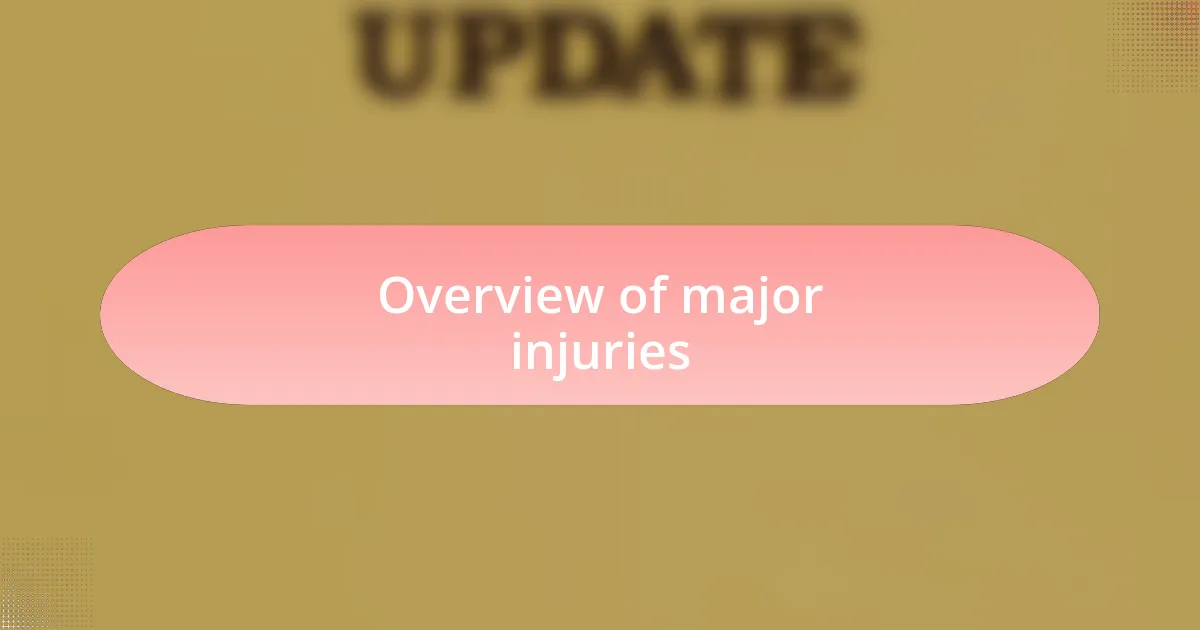
Overview of major injuries
Major injuries can change the course of our lives in an instant. I remember a time when a simple game of rugby led to a devastating fracture. That moment was surreal; one minute, I was in the game, and the next, I was grappling with pain and uncertainty about my future.
There’s something profoundly unsettling about knowing that your body, which you often take for granted, can suddenly fail you. Perhaps you’ve experienced a similar situation? It’s during these moments of vulnerability that we often reassess not just our physical capabilities but our mental resilience.
Injuries like these are not just about the physical toll; they also leave emotional scars. The fear of re-injury or the worry about never returning to one’s former self can be daunting. It’s a journey marked by both physical rehabilitation and emotional endurance, pushing us to dig deeper than we ever thought possible.
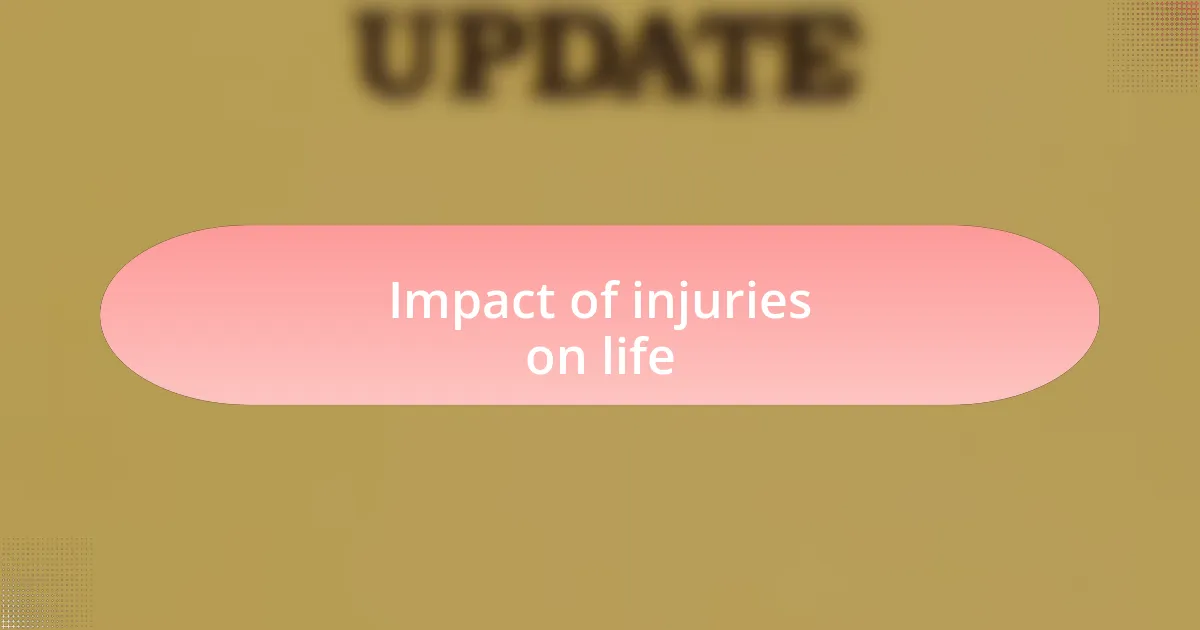
Impact of injuries on life
Experiencing a major injury can feel like a seismic shift in one’s life. I recall the countless days spent in physical therapy, where each exercise was a confrontation with my limitations. Have you ever faced a challenge that forced you to redefine your goals? For me, those sessions were not just about recovering strength; they also taught me resilience, highlighting how much our strength resides in our mind.
Life doesn’t pause for an injury. It was eye-opening to see how relationships and daily routines were altered. Friends, once eager to play weekend sports together, suddenly became distant, unsure of how to connect with someone in recovery. This shift stirred feelings of isolation, further emphasizing how injuries impact not only the body but also our social interactions and mental health.
Moreover, the process of healing can sometimes expose deeper insecurities. I remember sitting quietly after another day of frustration, wondering if I’d ever regain my former physical abilities or if I’d need to reinvent my identity. Have you ever had to grapple with such life-altering questions? The journey taught me that while injuries can derail us temporarily, they also provide an opportunity for reflection and growth, reshaping our lives in ways we might never expect.
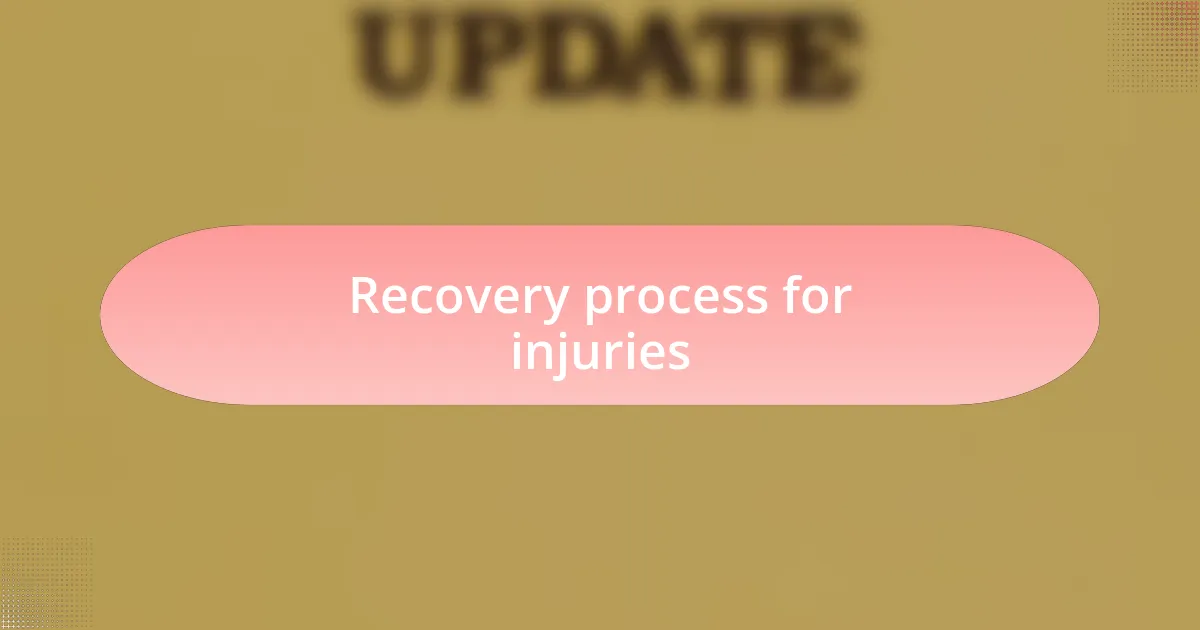
Recovery process for injuries
Recovery from an injury is not just a physical journey, but a mental one as well. I remember my first day back at the gym after my injury; the weights felt impossibly heavy, both physically and emotionally. It was a humbling reminder that progress often comes in small, sometimes frustrating steps. Have you ever felt the thrill of trying again despite the odds? Each small win, like lifting a little more or completing a longer run, slowly rebuilt my confidence.
The role of mental health in recovery cannot be overstated. I found that journaling my thoughts and emotions provided a safe space to process everything. On tough days, I would often write about my struggles, which surprisingly helped me see the light at the end of the tunnel. How often do we overlook the power of our thoughts? By documenting my emotions, I was not only acknowledging my challenges but also celebrating my resilience, creating a tangible record of my journey.
Physical therapy became a vital part of my routine, but it was equally important to engage with supportive friends and family. I vividly remember a close friend who joined me at therapy sessions, turning what felt like a chore into a shared experience. Have you ever had someone stand by your side during a tough time? Their encouragement and understanding made a significant difference, reminding me that recovery is often about building a community just as much as it is about individual effort.

Seeking professional help
Seeking professional help was one of the most constructive decisions I made during my recovery journey. I remember my first session with a physiotherapist who specialized in sports injuries. I walked in feeling defeated but left feeling empowered, as we outlined a tailored recovery plan that addressed both my physical limitations and emotional hurdles. When was the last time a professional truly understood your needs and helped you design a path forward?
As I progressed, I also sought out a psychologist who had experience in rehabilitation. Initially, I hesitated—was it really necessary? But, reflecting on those sessions now, I see the value in working through my feelings of frustration and fear. Talking to someone who understood the complex emotional landscape that accompanies physical injuries was transformative. It’s crucial to remember that healing isn’t only about the body; it’s also about nurturing your mental state.
Engaging with professionals taught me that asking for help is a sign of strength, not weakness. I’ll never forget the moment my therapist celebrated my first major milestone with me—a simple act of tying my shoelaces without pain. It felt monumental. Have you recognized the importance of professional guidance in your own journey? I can assure you that having the right support system can dramatically change your recovery experience.
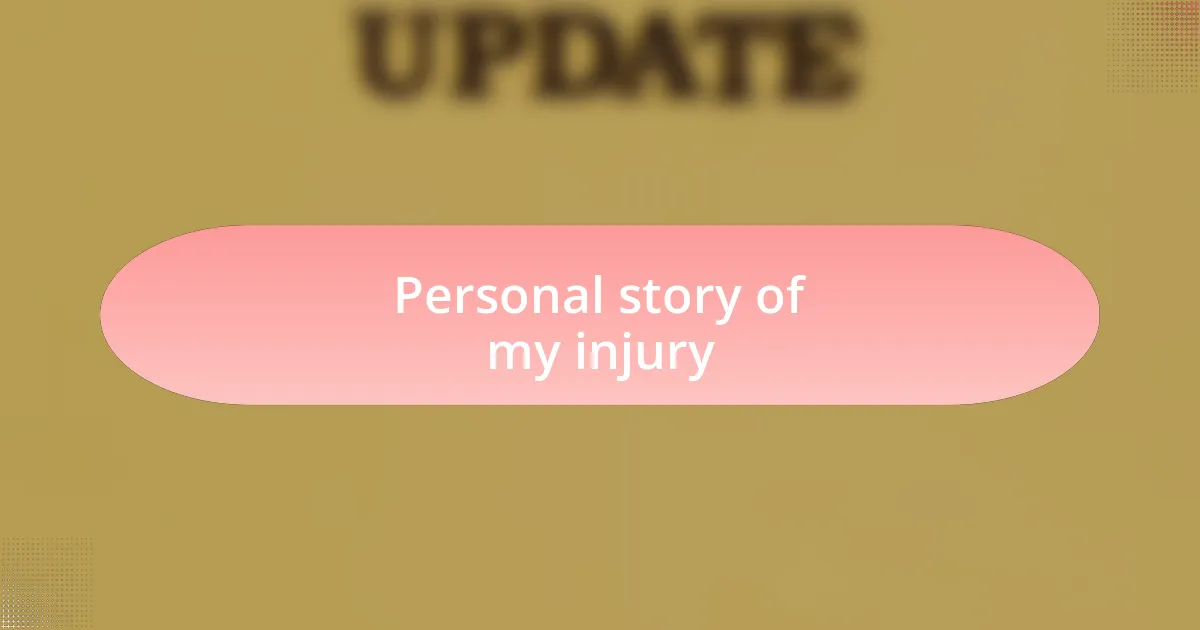
Personal story of my injury
The injury itself was a jarring pivot in my life. I remember the exact moment it happened—one slip on the field during a match that sent me crashing to the ground. I felt a sharp pain radiating through my leg; in an instant, my world shrank to that singular experience of discomfort and disbelief. Have you ever faced a moment that completely shifted your perspective on your capabilities?
As the days wore on, I found myself grappling not only with physical pain but also with an overwhelming sense of loss. I vividly recall staring at my gear, untouched and dusty, filled with a longing for the camaraderie and freedom that came with playing. It was as if each item was a painful reminder of what I could no longer do. Have you experienced that haunting sense of nostalgia when faced with an obstacle that interrupts your passion?
In the depths of those initial weeks, I learned just how isolating an injury could be. Friends and teammates, while well-meaning, would often say, “You’ll bounce back!” But how could they understand the weight of each passing day filled with uncertainty? It struck me that true recovery goes beyond the physical; it demands confronting emotional waves that can crash in unexpectedly. Reflecting on this, I often wonder: how do we share our stories of struggle and resilience without feeling vulnerable?
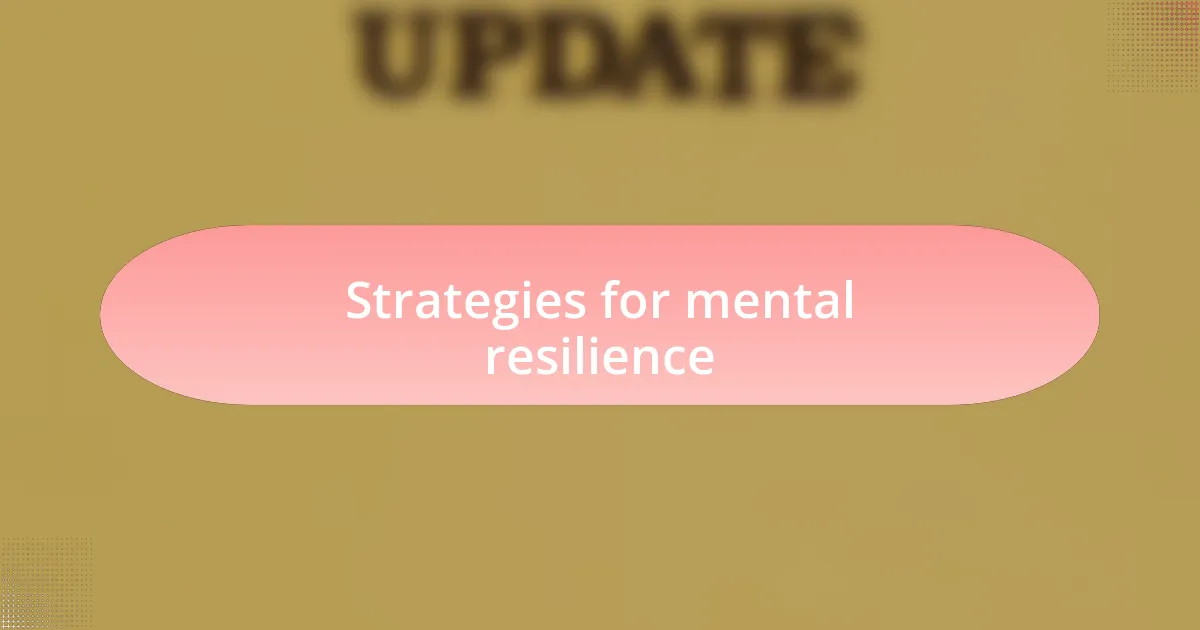
Strategies for mental resilience
Developing mental resilience is like strengthening a muscle; it requires consistent training and a willingness to push through discomfort. During my recovery, I found a lifeline in mindfulness practices. Taking a few minutes each day to meditate or reflect on my thoughts gave me clarity amidst the turmoil. Have you ever taken a moment to just breathe and check in with yourself? For me, those moments became anchors, allowing me to regain control over my emotions and focus on the present.
Another strategy that proved invaluable was establishing a support system. I leaned on friends who understood the journey I was on. I recalls nights spent with close friends who would share their own struggles, creating a safe space to vent and heal together. Have you found comfort in sharing your challenges with someone else? By opening up, I realized that vulnerability can lead to strength, and in those shared moments, I felt less alone.
Lastly, setting small, achievable goals was crucial in rebuilding my mental fortitude. Instead of fixating on a distant return to the field, I focused on daily victories—like physical therapy milestones or even just getting through a tough day. Celebrating these little wins kept my spirits high and nurtured a sense of purpose. Can you relate to finding joy in the small things during a difficult time? It was through these incremental successes that I gradually built a resilience that allowed me to face both the challenges of recovery and life beyond my injury.

Lessons learned from my experience
While recovering from my injury, I realized the importance of patience. There were days when the frustration of slow progress felt overwhelming. I learned to embrace the journey rather than rush it. Have you ever found that when you stop pushing for immediate results, the process becomes more rewarding? For me, accepting the pace of my recovery allowed me to appreciate the effort involved, and I discovered that healing takes time.
Another vital lesson was understanding the power of gratitude. Instead of dwelling on what I had lost, I began to focus on what I still had. I often took walks, noticing the beauty around me—the sun, the trees, and even the little things that sparked joy. This shift in perspective had a transformative effect on my mood. Has expressing gratitude ever shifted your mindset? I found that by practicing gratitude, I could cultivate a positive outlook, reinforcing a mindset that fosters healing.
Finally, I learned the art of self-compassion. There were days I felt defeated and struggled with negative thoughts, but I made a conscious effort to treat myself with kindness during these tough moments. I asked myself: Would I speak to a friend the way I spoke to myself? By reframing my inner dialogue, I started to foster a healthier self-image. This shift led to a profound sense of acceptance and resilience. How do you remind yourself to be gentle with your own struggles? I found that approaching myself with compassion allowed me to recover not just physically but emotionally too.